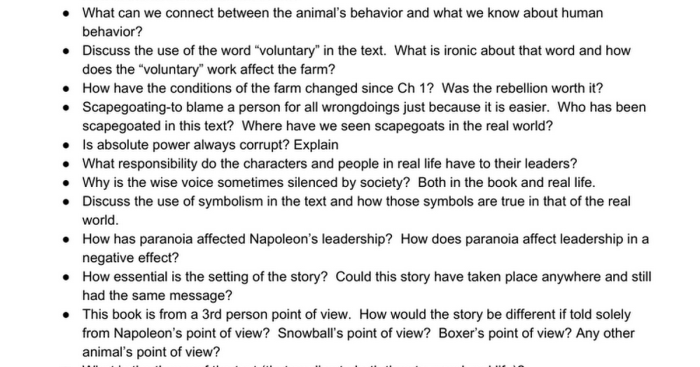Socratic seminar questions for Animal Farm ignite critical thinking and foster insightful discussions about this timeless allegorical tale. By delving into the novel’s profound themes, characters, and symbolism, these questions stimulate a deeper understanding of the human condition and the complexities of power.
Through the lens of Socratic inquiry, students engage in thought-provoking conversations, exploring diverse perspectives and challenging assumptions. Animal Farm serves as a fertile ground for such discussions, inviting students to examine the nature of revolution, the dangers of tyranny, and the fragility of human nature.
Socratic Seminar Structure

A Socratic seminar is a structured discussion method that encourages critical thinking and in-depth analysis of a text. It aims to develop students’ ability to articulate their ideas clearly, question assumptions, and consider multiple perspectives.
Step-by-Step Guide to Conducting a Socratic Seminar
- Select a text:Choose a text that is complex and thought-provoking, such as a novel, essay, or article.
- Prepare questions:Develop a set of open-ended questions that encourage students to think critically about the text and explore its themes, characters, and symbolism.
- Set up the classroom:Arrange the classroom in a circle or horseshoe shape to promote student interaction.
- Introduce the text:Provide a brief overview of the text and its context.
- Pose the first question:Select a question that will spark discussion and encourage students to share their initial thoughts.
- Facilitate the discussion:Encourage students to actively participate by asking follow-up questions, challenging assumptions, and connecting ideas.
- Summarize key points:Periodically summarize the main points of the discussion to keep students focused and on track.
- Wrap up the seminar:Conclude the discussion by summarizing the main points and highlighting any areas for further exploration.
Best Practices for Facilitating a Socratic Seminar
- Create a safe and respectful environment:Encourage students to express their opinions without fear of judgment.
- Use open-ended questions:Questions that begin with “what,” “why,” or “how” encourage deeper thinking and avoid yes/no answers.
- Encourage student participation:Call on all students to share their ideas, regardless of their level of confidence.
- Challenge assumptions:Ask students to question the underlying assumptions behind their arguments.
- Connect ideas:Help students make connections between different ideas and perspectives.
- Summarize and reflect:Regularly summarize the main points of the discussion and encourage students to reflect on their own learning.
Socratic Seminar Questions for Animal Farm
Themes, Socratic seminar questions for animal farm
- The dangers of totalitarianism and the abuse of power.
- The importance of critical thinking and questioning authority.
- The struggle for equality and the corrupting influence of power.
Characters
- Napoleon: A charismatic and ambitious pig who becomes the leader of the animals after the rebellion.
- Snowball: A clever and idealistic pig who represents the spirit of the revolution.
- Squealer: A persuasive and manipulative pig who serves as Napoleon’s propaganda minister.
- Boxer: A loyal and hardworking horse who represents the proletariat.
Symbolism
- The animals: Represent the different classes of society, with the pigs representing the ruling class.
- The windmill: Represents the unfulfilled promises of the revolution and the exploitation of the animals.
- The pigs’ takeover of the farmhouse: Symbolizes the corruption and betrayal of the revolution.
Socratic Seminar Discussion Points

Potential Discussion Points
- Is Napoleon a true leader or a tyrant?
- What are the similarities and differences between the pigs and the humans?
- How does the novel explore the themes of equality and justice?
- What are the lessons that can be learned from the events in Animal Farm?
Evidence from the Text
- Napoleon’s manipulation of the animals’ emotions to gain power: “He had a habit of calling his followers ‘comrades,’ and he gave them little presents of apples and lumps of sugar.” (Chapter 3)
- The pigs’ distortion of the commandments to justify their actions: “All animals are equal, but some animals are more equal than others.” (Chapter 10)
- The animals’ realization that their revolution has failed: “They had simply exchanged one tyrant for another.” (Chapter 10)
Different Perspectives
- Some students may arguethat Napoleon is a true leader because he is able to maintain order and control on the farm.
- Others may arguethat he is a tyrant because he abuses his power and oppresses the other animals.
- The novel presents multiple perspectiveson the events in Animal Farm, and it is up to the students to decide which interpretations they find most convincing.
Socratic Seminar Extensions: Socratic Seminar Questions For Animal Farm
Beyond the Classroom
- Have students create a multimedia presentation:This could include a video, podcast, or website that explores the themes and characters of Animal Farm.
- Organize a field trip:Visit a historical site or museum that relates to the themes of the novel, such as a civil rights museum or a Holocaust museum.
- Invite a guest speaker:Invite a historian, political scientist, or author to speak to the class about the novel and its historical context.
Creative Activities
- Have students write a sequel to Animal Farm:This could explore what happens to the animals after the events of the novel.
- Have students create a graphic novel:This could adapt the novel into a visual format, making it more accessible to a wider audience.
- Have students stage a play:This could help students to develop a deeper understanding of the characters and their motivations.
Assessment Rubric
- Participation:Students actively participate in the discussion, ask thoughtful questions, and respond to others.
- Understanding:Students demonstrate a deep understanding of the novel’s themes, characters, and symbolism.
- Critical thinking:Students question assumptions, challenge perspectives, and make connections between different ideas.
- Communication:Students communicate their ideas clearly and effectively, using evidence from the text to support their arguments.
Helpful Answers
What is the purpose of a Socratic seminar?
Socratic seminars foster critical thinking, promote dialogue, and encourage multiple interpretations of a text.
How do I conduct a Socratic seminar?
Follow a step-by-step guide that includes setting clear expectations, posing open-ended questions, and facilitating respectful discussions.
What are some best practices for facilitating a Socratic seminar?
Establish a safe and inclusive environment, encourage active listening, and provide opportunities for students to share their perspectives.


